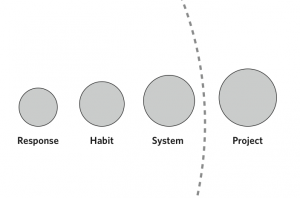I was mentoring a bookkeeper recently who was ready to recruit but was embarrassed about the state of her business. She was a great bookkeeper and was dedicated to her clients. She had systems in place for their bookkeeping and was very organised. She was always up to date, provided them with timely reports and educated them around the numbers so they could make strategic decisions. She helped manage their cash flow and made sure their debtors paid on time. She knew she needed to do the same for her business, but she always prioritised their needs above her own.
As a result her BAS was always the last to be done and she was often late billing clients which caused cash flow problems. Because she was always behind with her own bookkeeping she hadn’t set financial KPI’s, budgets or cash flow analysis and often didn’t even look at the P & L for months, although she knew this was crucial. And don’t even talk about the filing! She was able to ignore the situation because she was on her own and she was getting by, but she knew if she wanted a team and expected them to follow Best Practices, she had to lead by example.
This was something I struggled with as well. One of the solutions was having an accountability structure and Peter Cook was the person who provided that for me. I knew I had to have actions ticked off and projects completed for each meeting and I hated making excuses.
 To create “Best Practices” and a business you’re proud of you need to put it under a magnifying glass. It’s a project that matters because it will prepare your business for the next stage. Set an end date and break it into do-able weekly actions. Ask a family member, colleague or close friend who understands your vision to give you the accountability structure you need to help you see the project through to completion and on time.
To create “Best Practices” and a business you’re proud of you need to put it under a magnifying glass. It’s a project that matters because it will prepare your business for the next stage. Set an end date and break it into do-able weekly actions. Ask a family member, colleague or close friend who understands your vision to give you the accountability structure you need to help you see the project through to completion and on time.
Love to hear your thoughts, you can leave them below.
Article by Debbie Roberts
Subscribe Now
Recent Posts
- 📅 Say Hello to the New Centralized Event Calendar!
- Compliance Essentials for Bookkeeping Business Owners: BAS Agent Registration, ATO Deadlines, and More
- Pricing Strategies for Bookkeeping Services in 2025
- Getting Started with Your Own Bookkeeping Business: A Step-by-Step Guide
- AI in Bookkeeping: Trends to Watch in 2025




